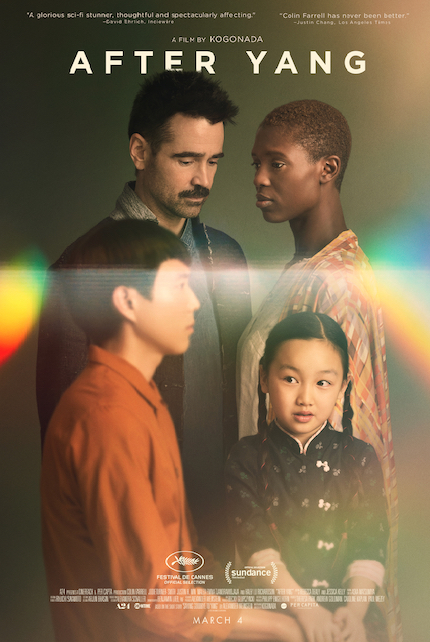Review: AFTER YANG, Superlative Speculative Fiction
Colin Farrell and Jodie Turner-Smith star in a minimalist, lo-fi sci-fi tale, directed by Kogonada.

To say there aren’t enough superlatives in the English language to describe After Yang, writer-director Kogonada’s (Columbus) minimalist, lo-fi sci-fi fable that explores the myriad connections between identity, memory, and technology, might sound like hyperbole, but it’s not hyperbole if it’s true.
After Yang deserves all the superlatives and any of the accolades it ultimately receives. (It’s already received the 2022 Alfred P. Sloan Foundation Feature Film Prize from the Sundance Film Festival.) Not only does After Yang confirm Kogonada as one of the best filmmakers working today but also elevates him to the front rank of world-class filmmakers (again, more hyperbole, and so forth).
Freely adapted from Alexander Weinstein’s (Children of the New World, Universal Love) short story, “Goodbye to Yang,” After Yang centers on a futuristic multi-ethnic, multi-racial family, Jake (Colin Farrell), a tea store owner; Kyra (Jodie Turner-Smith), Jake’s wife and a successful professional; Mika (Malea Emma Tjandrawidjaja), their Chinese-born, adopted daughter; and the titular character, Yang (Justin H. Min), an android/A.I. purchased as Mika’s principal caregiver, friend, and surrogate brother. Created specifically for children like Mika, Yang helps to connect Mika to her cultural roots, in part through “Fun Chinese Facts,” but also through a nature-oriented worldview.
In After Yang’s lightest, most fun moment, the family competes in a dance-off against 30K other families via an unseen video connection. As an offscreen voice directs families through complex, coordinated dance moves, the offscreen voice disqualifies any families who fall out of sync. The Jake-Kyra-Mika-Yang family eventually falter, but not before making it through several rounds.
The scene also functions as the example of the family structure in microcosm -- collectively, they can succeed, individually, they can't -- and also serves as the last moment they’re together. Almost immediately, Yang malfunctions, falling into a kind of suspended animation. With Mika understandably heartbroken, Jake springs into action mode, transporting Yang first to the second-hand robotics store, Second Siblings, where he purchased Yang as “certified refurbished” and when that fails, to the not-quite-legal auspices of a self-employed tech repairman and conspiracy theorist, Russ (Ritchie Coster).
Where Russ rants and raves about corporate surveillance and capitalistic control, Jake takes a more agnostic view, hoping against hope to restore Yang to Mika and thus bring their family back into balance or equilibrium. An ideas tour of sorts follows, with Jake, Yang literally in hand, ventures to the Museum of Technology and a senior curator, Cleo (Sarita Choudhury), who helps Jake recover Yang’s memories via hard drive. It’s there, with Jake reliving key moments of Yang’s life, essentially seeing and hearing through Yang’s recollections of his interactions with Jake, Kyra, and Mika (among others) that After Yang reaches peak poignancy and profundity.
The idea of reliving someone else’s memories isn’t new, of course (see, e.g., Strange Days, Until the End of the World) or an android helper evolving into something beyond his or her programming (Bicentennial Man), but it’s often not the idea, or just the idea, but what a filmmaker does with that idea or ideas. Here, Kogonada doesn’t just dig deep, exploring the connections between memory, identity, and technology, but goes further by placing that exploration in specific, specifically-relatable context: A family unexpectedly learning to grieve for what a member they initially considered less than human, but in fact quietly lived, loved, and existed as fully human.
It’s that realization, earned through the observation of Yang’s first-person memories that forms the core of Jake’s journey, and with it, an understanding of the magnitude of the loss Mika has experienced and in turn helping him to recognize the need to reconnect with Mika as her father. The other characters experience similarly parallel journeys toward reconnection and healing.
Paradoxically given our current, overweening over-reliance on technology, Kogonada posits a different, far more positive relationship with technology. Instead of separating or superficially connecting us, technology can connect us on the most basic, fundamental level.
Review published originally during the Sundance Film Festival in January 2022. The film will open in U.S. movie theaters on Friday, March 4, via A24 Films.







